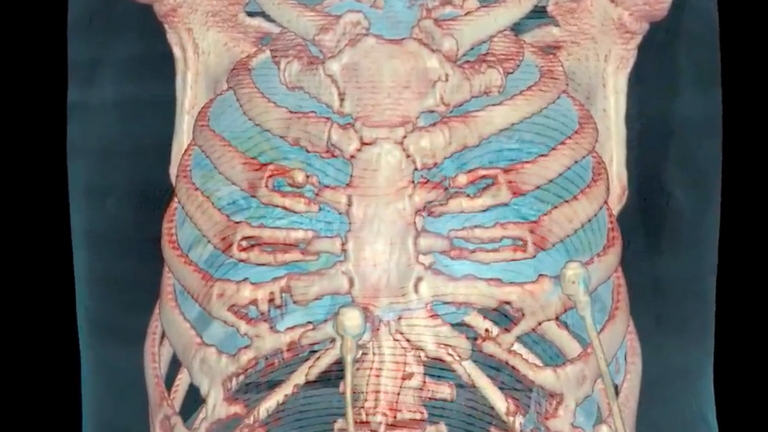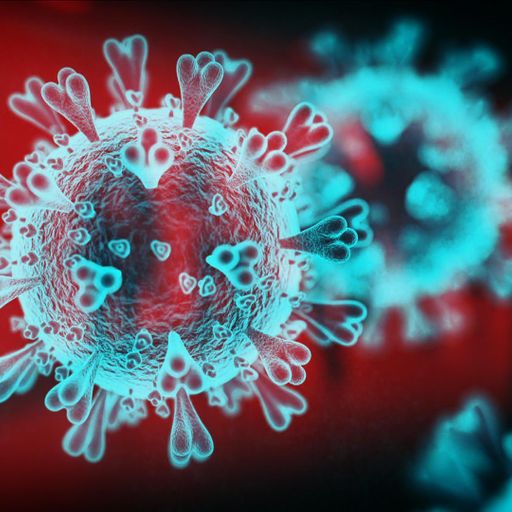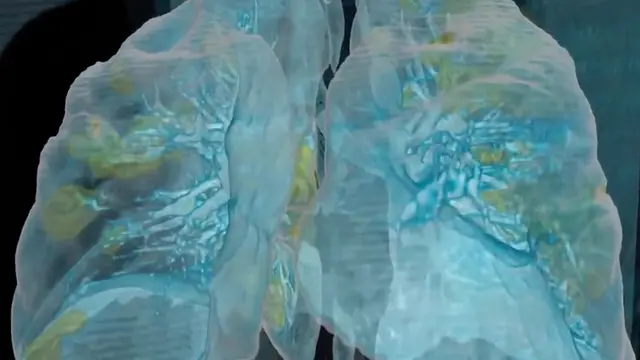Doctors treating coronavirus patients have noticed a strange phenomenon among some sufferers dubbed "happy hypoxia" - and have warned the condition could be deadly.
Some
COVID-19
patients with extraordinarily low blood-oxygen levels have been able to chat to doctors, scroll on their phones and have generally described themselves as comfortable, according to Science Magazine.
A normal blood-oxygen saturation is at least 95% and in most lung diseases, such as pneumonia, if those levels drop they have adverse effects, including fluid-filled lungs or rising levels of carbon dioxide, leaving patients feeling short of breath.

Image:Images were recently released showing how coronavirus damaged a patient's lungs. Pic: George Washington University Hospital
But while patients struggle to breathe with damaged lungs in serious cases of COVID-19, early in the disease low blood-oxygen levels is not always coupled with obvious respiratory difficulties, Science Magazine reported.
Coronavirus
patients can be breathing comfortably with normal carbon dioxide levels but have oxygen saturation levels in the 70s, 60s, 50s or even lower, the journal said.
Although mountain climbers can have similar readings, some doctors believe it is potentially "ominous" in COVID-19 patients, Nicholas Caputo, an emergency physician in New York, told the publication.
Dr Jonathan Bannard-Smith, a consultant in critical care and anaesthesia at Manchester Royal Infirmary, told the Guardian that it was "an example of very abnormal physiology going on before our eyes".

The infection numbers in real time
"We're seeing oxygen saturations that are very low and [patients] are unaware of that," he said.
"We wouldn't usually see this phenomenon in influenza or community-acquired pneumonia."
Theories are emerging around the cause of "happy hypoxia" in coronavirus patients, with many doctors now recognising clotting as a major feature of severe COVID-19.
Elnara Marcia Negri, a pulmonologist in Sao Paulo, told Science she believes subtle clotting might begin early in the lungs, prompting blood from getting properly oxygenated.
The phenomenon has also prompted a debate on how to treat coronavirus patients.
**:: Listen to the Daily podcast on **
Apple Podcasts
**, Google Podcasts
, Spotify
, Spreaker
**
Luciano Gattinoni, a guest professor in intensive care at the University of Göttingen Medical Centre in Germany, has reportedly warned against swooping in to inflate lungs with ventilators or high-pressure oxygen when patients seem comfortable.
Dr Gattononi said those measures could harm lungs that are inflating on their own but may be needed if patients are not helped by non-invasive treatment, Science reported.
Studies are yet to be done on whether early detection of hypoxia might help treat coronavirus patients.
 简体中文
简体中文

